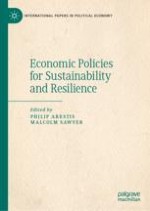
2022 | OriginalPaper | Buchkapitel
1. Macro-Economic and Financial Policies for Sustainability and Resilience
verfasst von : Philip Arestis
Erschienen in: Economic Policies for Sustainability and Resilience
Aktivieren Sie unsere intelligente Suche, um passende Fachinhalte oder Patente zu finden.
Wählen Sie Textabschnitte aus um mit Künstlicher Intelligenz passenden Patente zu finden. powered by
Markieren Sie Textabschnitte, um KI-gestützt weitere passende Inhalte zu finden. powered by